- Can Horses Eat Watermelons - September 23, 2023
- How to Get a Horse to Trust You - September 21, 2023
- Best Horse Wormers for Spring Guide - August 10, 2023
- The Answer: Should You Feed Watermelon to Horses?
- The Benefits of Watermelons for Horses
- How to Safely Feed Watermelon to Horses
- Safety Tip #1 - Introduce It Slowly
- Tip #2- Prepare It Correctly
- Safety Tip #3 - Feed It in Moderation
- Safety Tip #4 - Don't Feed Watermelon to Horses with Metabolic Conditions
- Other Safe Treats for Horses
- Things You Should Never Feed to Horses
- FAQs
- Can Horses Eat Watermelons - Summary
- Resources
In my years working with horses, I’ve learned that they can safely eat many fruits and vegetables. We all know that horses love apples and carrots, but, like us, they appreciate variety in their diet. Giving treats is a fantastic way to add extra nutrients to their diet – it’s also the perfect way to bond and reward them for good behavior.
If you love eating juicy watermelon in the summer, you might wonder if you can share it with an equine friend. So, in this guide, we’ll explore the answer to the question, can horses eat watermelon?
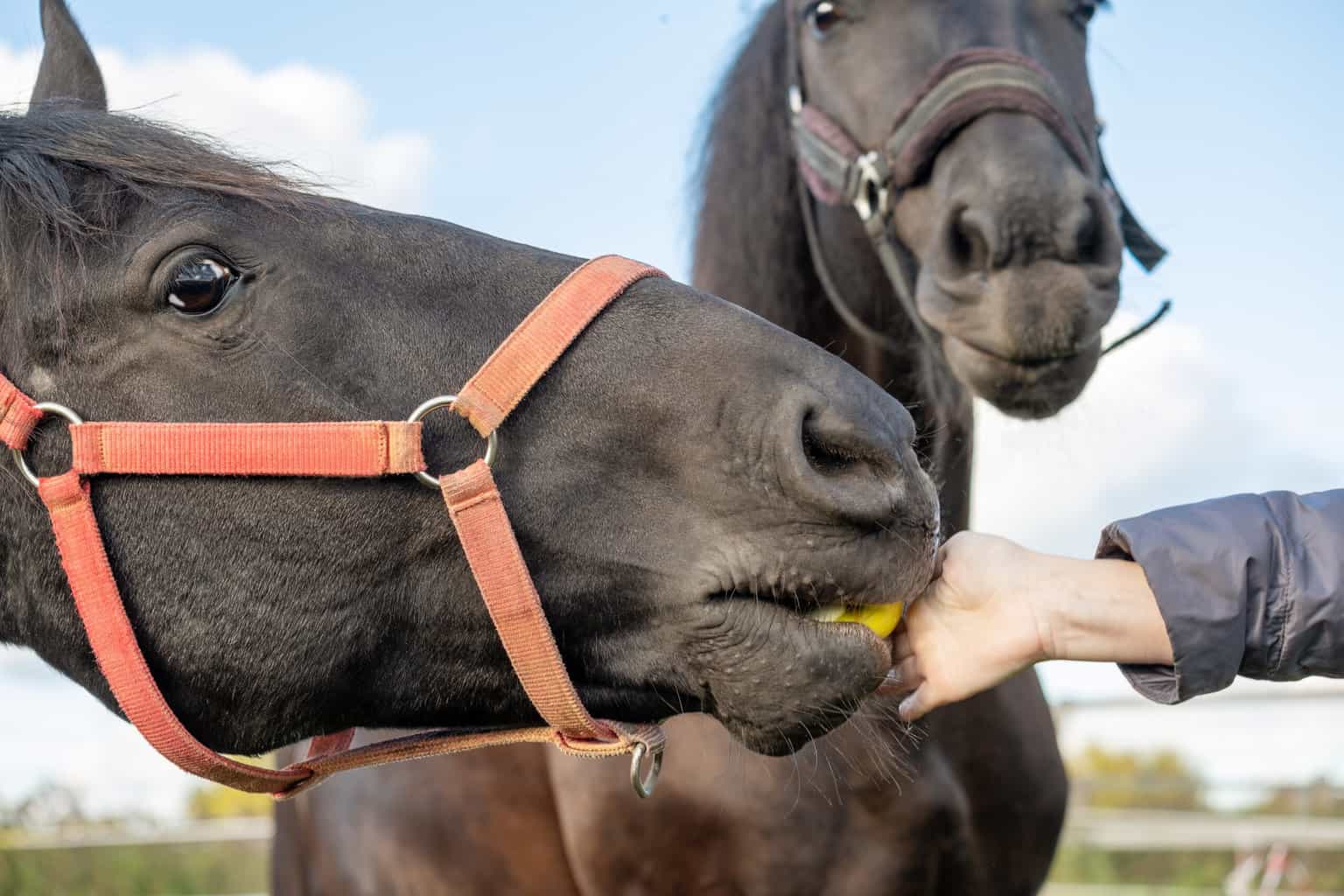
The Answer: Should You Feed Watermelon to Horses?
Watermelons are a safe, non-toxic treat for horses, and they can eat the pulp, rind and seeds. It’s packed with antioxidants and essential vitamins and minerals such as calcium, phosphorus and vitamin C.
Before giving watermelon to horses, I wash the rind and cut it into bite-sized pieces to prevent choking. I also feed it in moderation – to minimize the risk of colic and metabolic issues.
The Benefits of Watermelons for Horses
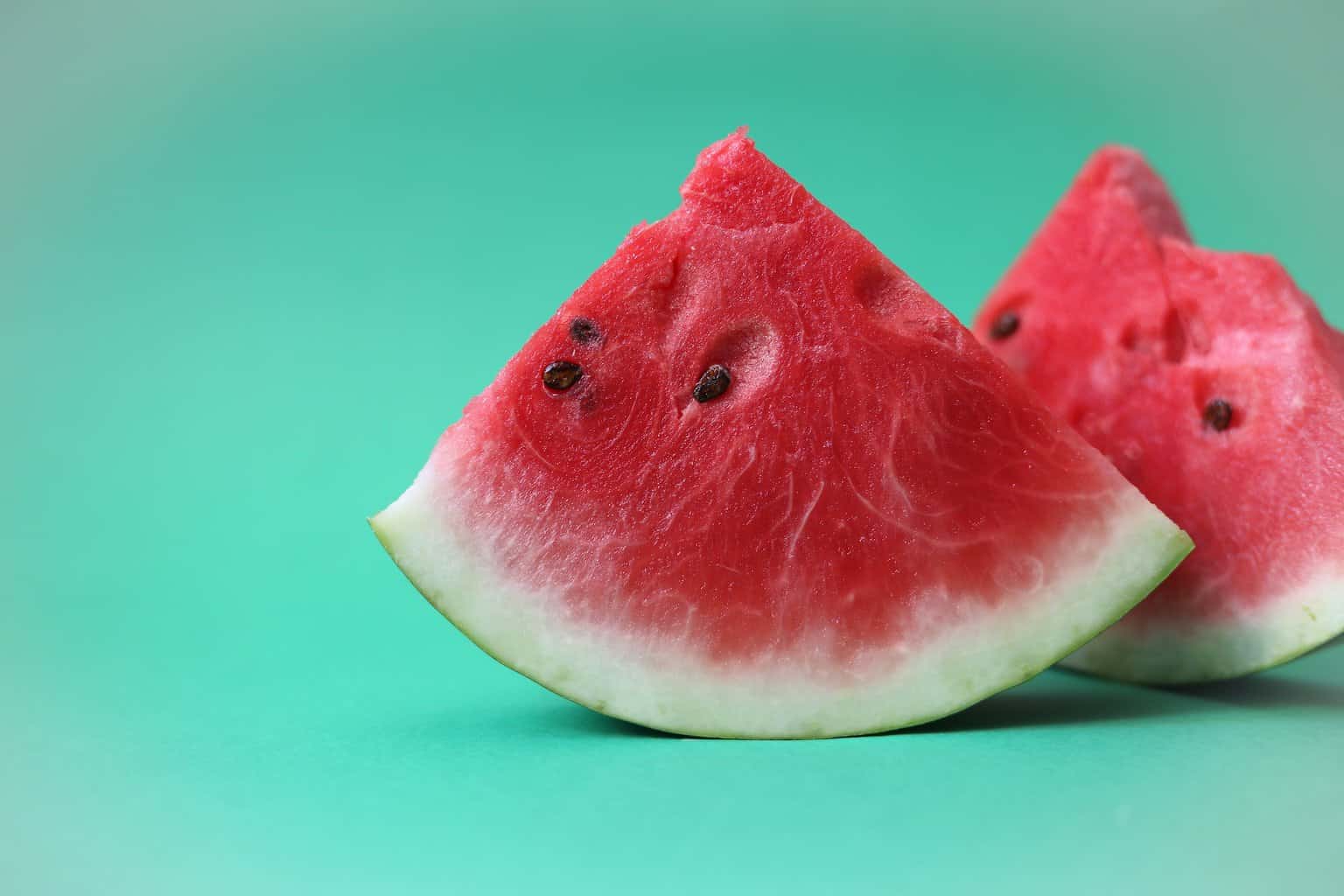
Watermelon is a fantastic snack for horses because it’s low-calorie and contains up to 92 percent water. It’s the perfect summer treat because it helps keep horses hydrated.
Here’s a quick overview of the nutritional value of 1 cup (154g) of watermelon and its health benefits.
| Fat: 0.2g | Vitamin C: 12.5 mg |
| Cholesterol: 0 | Vitamin A: 4.2mcg |
| Sodium: 1.5mg | Iron: 0.4mg |
| Carbohydrates: 11.6g | Potassium: 172mg |
| Sugar: 9.5g | Phosphorus: 16.9mg |
| Protein: 0.9g | Magnesium:15.2mg |
| Fiber: 0.6g | Calcium: 10.8mg |
It Aids Digestion
Watermelon contains fiber, which helps to keep a horse’s digestive system healthy. Horses are herbivores – and if they don’t eat enough fiber, they won’t absorb nutrients and are more prone to digestive complaints such as gastric ulcers.
It Boosts the Immune System
Vitamins C and A support the immune system and help keep skin, bones, connective tissue and blood vessels healthy, and are fantastic for heart health. Vitamin A also promotes healthy eyes, growth and development.
It Helps with Athletic Performance and Muscle Recovery
The amino acids in watermelon may help with performance and reduce inflammation after exercise. Magnesium, Phosphorus and Potassium support the nervous system and muscles and help with athletic performance and muscle recovery.
Watermelon is also high in antioxidants, so it helps reduce free radicals in the body caused by exercise.
How to Safely Feed Watermelon to Horses
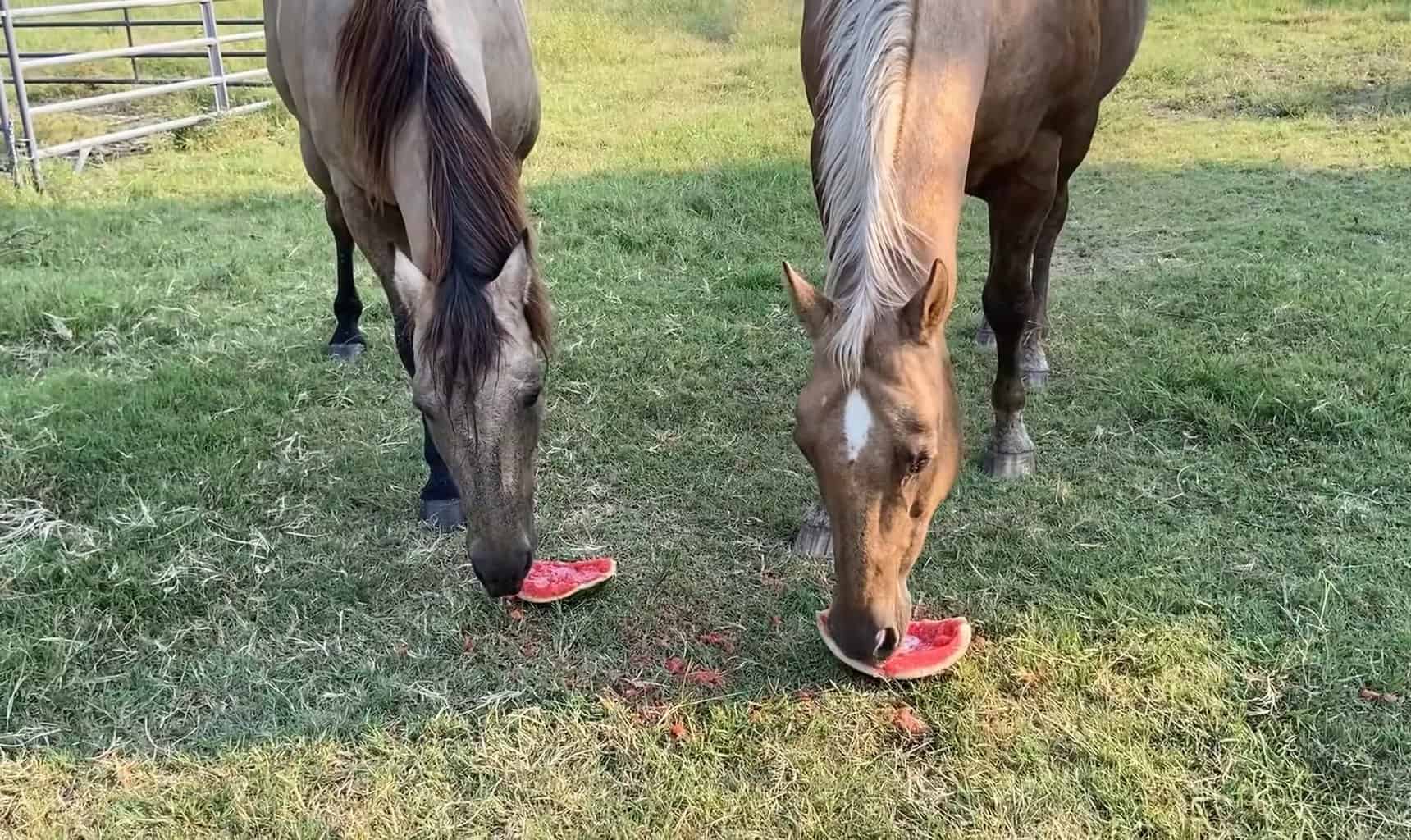
I’ve learned that giving treats to horses comes with risks, and even safe treats such as watermelon can harm a horse’s health if you don’t feed them correctly.
So, let’s take a look at how to feed watermelon safely to horses:
Safety Tip #1 – Introduce It Slowly
Horses have an incredibly delicate digestive system and can’t vomit, meaning if they eat something that doesn’t agree with them, they will usually develop colic. This is why I always give horses a “test piece” of a new treat, such as watermelon, before feeding them large amounts.
After I give horses a small test piece, I monitor them for twenty-four hours. If the horse is fine, I gradually increase the portion size over a week or two. If the horse shows any signs of gastric upset, on the other hand, such as loose droppings, I won’t give them any more of the treat.
Colic can be mild or severe, and although it doesn’t kill horses, if they roll around in pain too much, they can twist their gut, which can be fatal. You must call your veterinarian for advice if you suspect a horse has colic.
Signs of Colic Include
- Sweating
- Excessive rolling
- Pawing the ground
- Staring or biting at their stomach
- Not passing droppings
Tip #2- Prepare It Correctly
Before feeding horses watermelon, I wash it to remove dirt and pesticides and cut it into small, bite-sized pieces. I also remove moldy parts because bacteria on rotten food can make horses ill.
Next, I cut the watermelon into bite-sized chunks, around an inch squared. Large pieces can become lodged in the horse’s esophagus and cause choke.
Choke looks distressing, but it’s crucial not to panic, because unlike with humans, horses can still breathe when they choke. Choke a medical emergency, and I always call the vet if a horse is choking.
Signs of Choke Include
- Hypersalivation
- Coughing
- Mucous from the nose
- Stretching the head and neck
- Unable to eat or drink
Safety Tip #3 – Feed It in Moderation
You must feed watermelon in moderation because treats should only make up a tiny part of a horse’s diet. Horses aren’t designed to eat concentrated food, so large amounts of rich food can cause colic.
If a horse eats too many treats, it may be reluctant to eat their regular food, and too many treats can cause obesity and lead to metabolic conditions such as laminitis.
Safety Tip #4 – Don’t Feed Watermelon to Horses with Metabolic Conditions
Like most fruits, watermelon contains sugar, so I never feed it to horses with metabolic conditions. Even small amounts of sugar can have catastrophic consequences on horses with illnesses such as Cushing’s and laminitis.
Common Metabolic Conditions Include
- Laminitis – Laminitis is a painful foot condition which affects the pedal bone. It’s usually caused by a rich diet – and can be fatal in severe cases.
- Cushing’s – Cushing’s affects the pituitary gland and disrupts bodily functions such as metabolism.
- Equine Metabolic Syndrome (EMS) – EMS is the equivalent of type 2 diabetes in humans.
Other Safe Treats for Horses
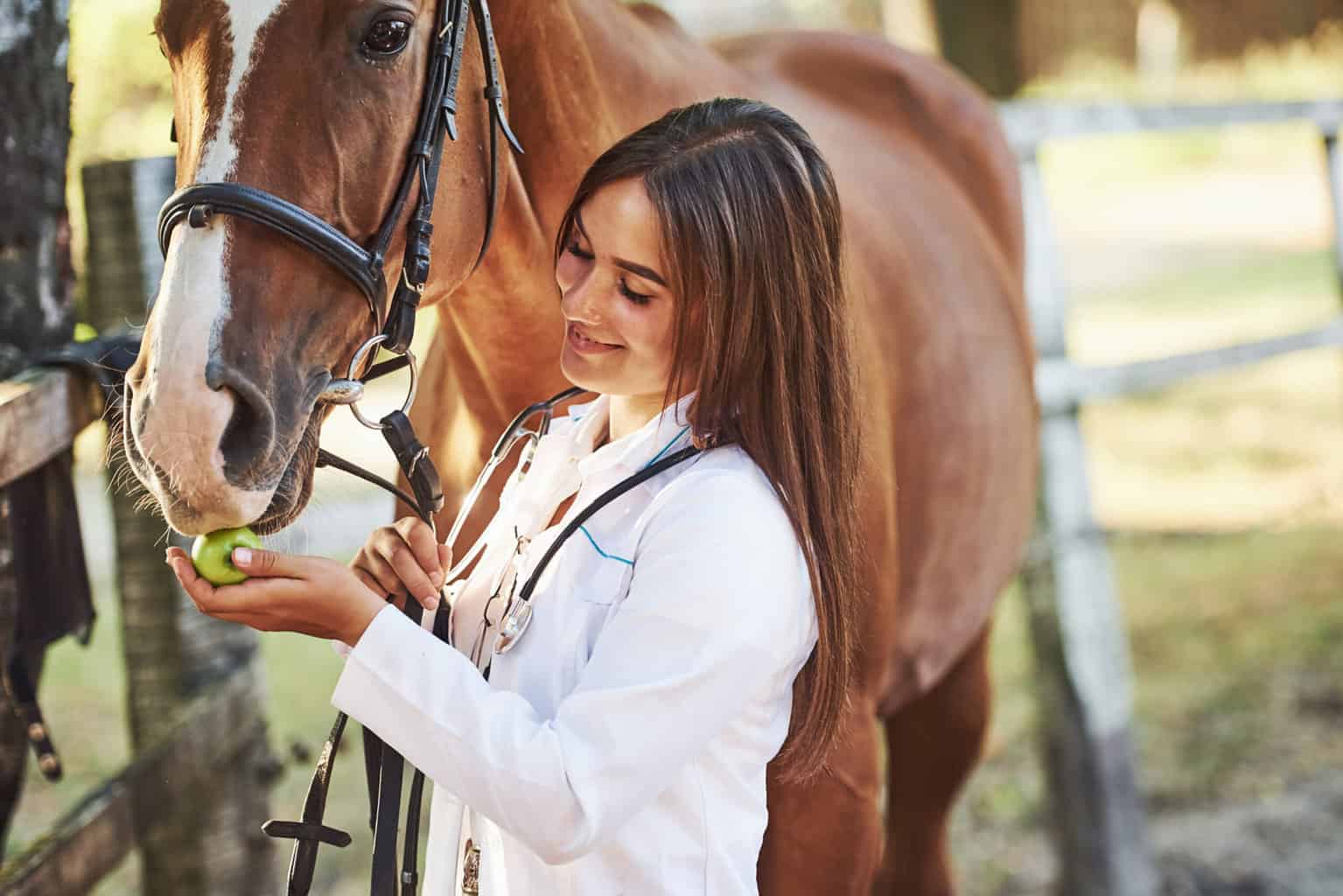
Horses can eat many fresh fruits and vegetables and I like to feed horses a variety of fresh treats to keep their diet varied and provide a range of vitamins and minerals.
If you want a change from apples and carrots, in addition to watermelon, you can also feed horses the following:
- Apricots
- Banana
- Blueberries
- Cucumber
- Grapes/Raisins
- Pears
- Pineapple
- Pumpkin
- Strawberries
These are just a few of the safe fruits and vegetables for horses. Check out my article about safe treats for horses for a fully comprehensive list.
Things You Should Never Feed to Horses
As I mentioned earlier, horses have a delicate digestive system, and there are several things they must never eat, such as:
- Acorns – Acorns are incredibly toxic to horses and can cause kidney failure.
- Animal products – Horses are herbivores and can’t digest animal products such as meat, eggs, milk, or cheese.
- Avocado – Avocado contains persin, which is toxic for many animals, including horses.
- Brassica Vegetables – Brassica vegetables, such as cauliflower, Brussels sprouts, kale, cabbage and broccoli, cause excessive gas – which can lead to colic.
- Chocolate – Chocolate contains theobromine, which is toxic to horses in large amounts. A tiny piece of chocolate won’t kill a horse, but I avoid feeding it to equines.
- Garlic – Garlic supplements are fantastic for horse health, but you should never give it raw.
- Grass Clippings – Grass clippings are moist and sticky, so they can ball up and cause an obstruction in the digestive tract. They may also contain poisonous weeds.
- Moldy or Rotten Food – The mold and bacteria on rotten food can make horses incredibly ill.
- Nightshade Plants – All nightshade plants, including tomato, eggplant, bell pepper, and potatoes, can make horses ill.
- Onions, leeks and shallots – These are toxic to horses because they contain N-propyl disulfide, which is poisonous.
- Persimmon – Horses can’t digest persimmon, and it can block the digestive tract.
- Processed Food – This includes potato chips, cookies, cakes and canned fruit. Processed foods are generally high in sugar and contain preservatives – which are unhealthy for horses.
- Rhubarb – Rhubarb contains several harmful toxins which are poisonous to horses.
FAQs
Answer: Horses can safely eat watermelon rinds, but I clean them first and cut them into bite-sized pieces to prevent choking. Like most fruit, the rind contains lots of fiber and high concentrations of vitamins and minerals.
Answer: Horses can safely eat all melons, including cantaloupe and honeydew. However, I remove the cantaloupe rind before feeding it because it’s not easy to clean and may contain dirt or pesticides.
Answer: I consider a horse’s size and exercise levels to determine how much watermelon they can eat. A large, active horse can eat more than a small, inactive pony. I would feed a large horse several pieces daily and a pony, one or two. I would never give a horse a whole watermelon because it would probably cause colic.
Can Horses Eat Watermelons – Summary
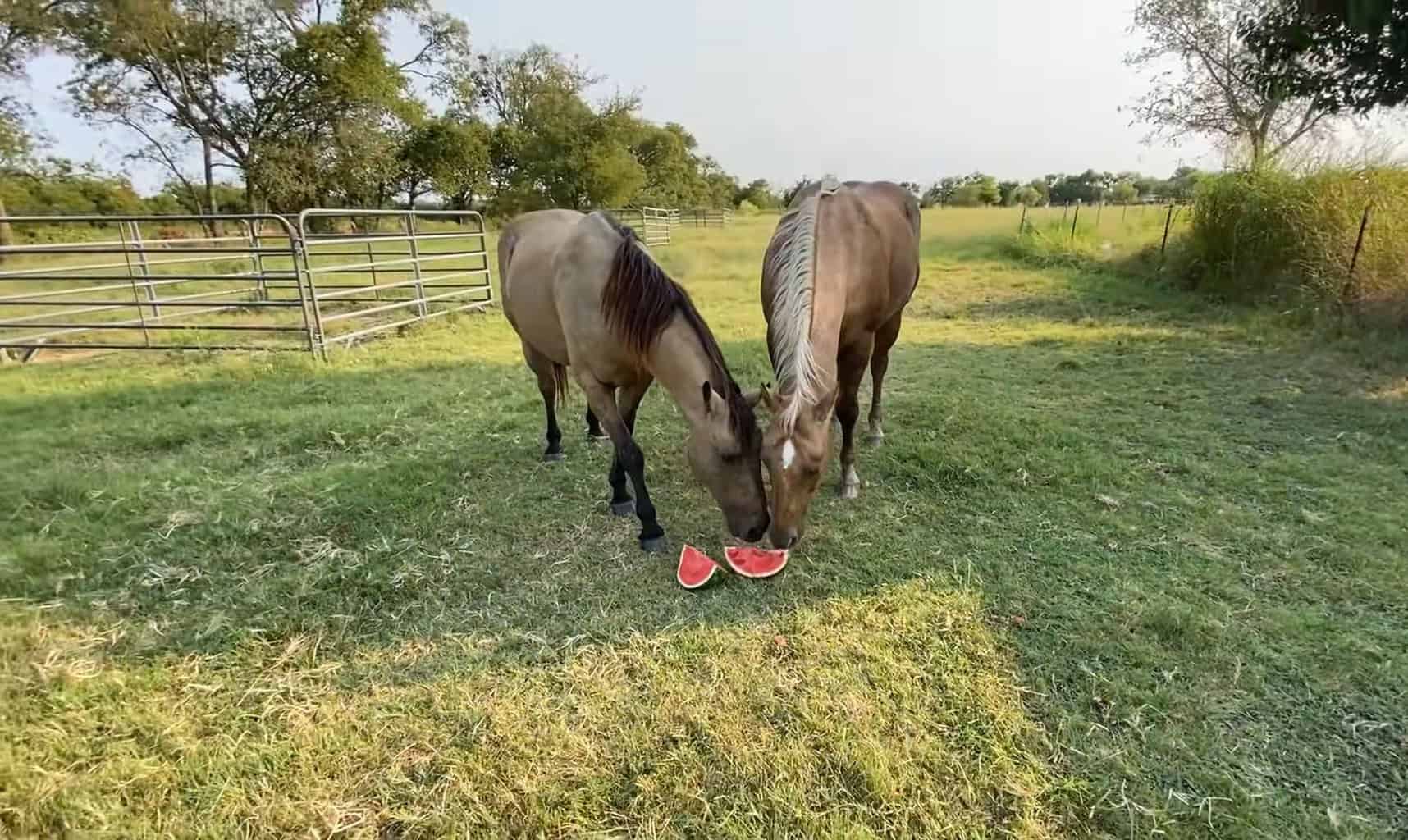
In summary – the answer to the question, can horses eat watermelons, is a resounding yes. I find most horses love eating juicy, sweet watermelon, especially on hot summer days.
To ensure a horse’s safety, I always wash and chop the watermelon into small bite-sized pieces before feeding it to horses. I also give it to them in moderation to prevent colic and always supervise horses when they eat treats.
Resources
- Equinews Editor Ony. (2017, December 29). Fiber: an important component in equine nutrition – Kentucky Equine Research.
- Healthdirect Australia. (n.d.). Vitamin C and your health. Healthdirect.
- Lee, A. (2023). Can horses eat watermelon? Helpful Horse Hints.
- Office of Dietary Supplements – Vitamin A and Carotenoids. (n.d.).
- Phillips, C., & Phillips, C. (2022). Importance of feeding fibre for healthy horses all-year round. Horse & Hound.
- Q&A: Watermelon for horses – Kentucky Equine Research. (2018, January 25). Kentucky Equine Research.
- Rd, R. a. M. (2023, June 26). 12 Evidence-Based Health Benefits of Magnesium. Healthline.
Read More: Horse Ownership Guide

